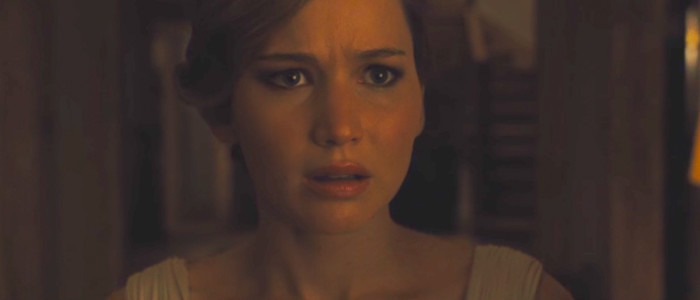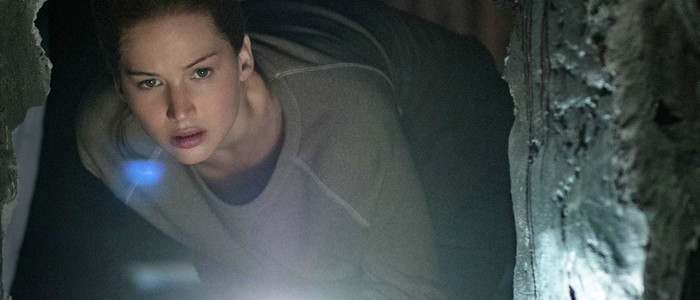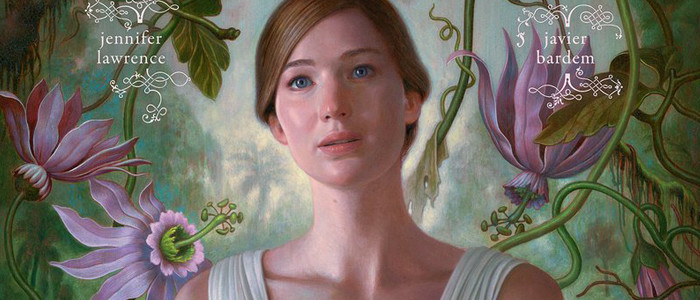The Five Most Interesting Things About Darren Aronofsky's 'Mother!'
[This post contains SPOILERS about the new Darren Aronofsky movie mother! For a look at the film without major spoilers, please read Chris Evangelista's review from the Toronto International Film Festival. mother! is in theaters today.]
A poet and his wife live in a peaceful, idyllic home, seemingly in the middle of nowhere. While the woman is happy, the man begins welcoming strangers into their home and sharing his belongings, until the cost to his wife becomes unspeakably high.
This is the plot of Darren Aronofsky's mother! which can be interpreted in many ways, but seems most obviously to be an allegory about the creation of the world, as told in the Christian Bible. I found the movie to be provocative, bold, and original, even as its basic conceit began to wear on me during the course of its two-hour runtime. This is a movie that will polarize people and cause some to walk out of theaters.
It's also unlike most things we'll see in at the mulitplex this year and for that, I'm grateful (it is absolutely insane that Paramount, a major studio, is releasing this). Here are five things I found to be the most interesting about the film.
God's Feminine Side
In her great review of mother!, Alissa Wilkinson posits that the Javier Bardem/Jennifer Lawrence dynamic (they are identified as merely "Mother" and "Him" in the credits) is a depiction of God's masculine and feminine side:
For Noah, Aronofsky played with Jewish mythology, but in Mother! he retwists the Christian version of the world's history, suggesting that it's always been told from the point of view of God's dominant masculine nature — and without much thought to what the feminine side might think. (For centuries, God has taken masculine pronouns in most translations of the Bible, but most Christian theology still maintains that he does not have a gender, and that male and female are both created in his image.) This is not orthodox, to put it mildly, but it makes for a completely fascinating new mythology.
We've never seen God's feminine side depicted on screen before, and as it's realized here, it's clear why: if God's feminine side is nurturing and patient, then His masculine side is forceful and inconsiderate. Ultimately, one side inevitably overpowers the other and makes its presence more clearly expressed.
The Depiction of the Creator as Cruel
I think it's no accident that Javier Bardem's character is an artist. One of the most interesting ways to read this film was is as an allegory of the toll the creation process takes on one's home life and marriage. Creation is an inherently egotistical and psychologically violent process. It involves conjuring something from nothing, with no real knowledge of the right circumstances under which that can occur.
It also implies that whatever the creator has to say is important, and that there is some value in realizing their vision, even at great cost to those who love and care for him. I recognized strands of myself in Javier Bardem's "Him," and was troubled by what I saw. Many people who try to create things will likely feel the same.
The Depiction of God as Egotistical
One of the biggest questions behind the Christian religion is: If God is perfect, why did He create the world, which is imperfect? One Christian theologist and pastor, John Piper, has advocated the idea that (I'm paraphrasing here) since God is so awesome, every one of God's actions is to show His glory. For some reason beyond human comprehension, the best way God had of doing that was to create a group of flawed creatures who choose, of their own free will, to worship Him.
But as it plays out in the movie, God's actions are profoundly selfish. Everything is great before Ed Harris' character, who represents Man, shows up (just as in Christian religion, theoretically things were pretty great before mankind showed up too!). Why ruin all that, God? The movie's answers: To feed God's insatiable ego. He needs all of his fans. He thrives on it. And in the end, it costs God his Son.
That Opening Shot
The movie opens with a shot of a woman who looks like Rachel Weisz standing in the fiery wreckage of a house. While we cannot confirm if this actress is Weisz (and will update accordingly if we learn more), the resemblance is uncanny. Shortly after, it transitions to Jennifer Lawrence waking up in bed. We later learn that the sequence of events we're seeing in the movie has already occurred many times.
If this means what we think it means, then isn't this profoundly fucked? Doesn't the movie imply that just like Aronofsky's artistic endeavors led to the end of his relationship with Weisz, his ex-wife, they will also do the same to his relationship with his current girlfriend, Jennifer Lawrence? And that eventually, a third woman will take their place? It's difficult for me to shake how troubling this implication is. But maybe not, because...
Apparently This Movie is About Climate Change?
In a statement, Aronofsky and Lawrence have indicated that Lawrence's character represents mother nature and that mother! is about climate change. Not only do I find this to be one of the less interesting ways to view the movie, I find it borderline disingenuous. One of the reasons mother! is interesting is that it seems to be an intensely personal confessional about Aronofsky's own life.
Yet the professed idea that the movie is an allegory about how we should take better care of earth seems to undercut a lot of the impact of those other readings. The movie doesn't read to me or most critics I've talked to as a grave warning to take care of one's house; it's about the toxic relationship between the two central characters, and how one exerts an unhealthy influence over the other while giving very little in return.
Still, this is one of the best things about the film: it is about whatever you want it to be. In the end, that's arguably its biggest strength.




